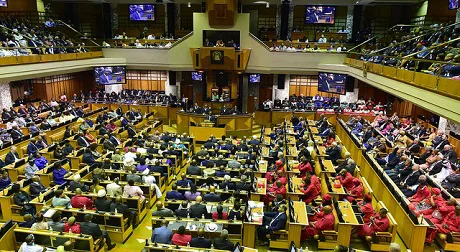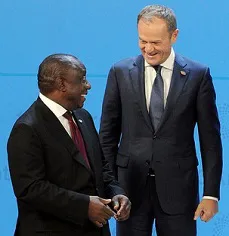“It feels like we’re in a state of emergency,” a Johannesburg caller tells talk radio, after recounting how much more fuel his car uses due to traffic jams when the power is out. South Africans feel a bit shaken after a Department of Public Enterprises official earlier this week confirmed their worst fears and told parliament that South Africa’s single national electricity provider was technically insolvent and at the current rate would cease to exist by April.
 Parliament during last week's State of the Nation address in South Africa (photo: GCIS)
Parliament during last week's State of the Nation address in South Africa (photo: GCIS)
It doesn’t really surprise South Africans, who have had a rude education into how the state apparatus had been co-opted by former President Zuma and his wide-reaching entourage.
Also, the many power outages – part of the national loadshedding scheme, designed to ease the load on the system by shedding 4,000 megawatts (during current stage 4 power cuts) – are a dead giveaway that there is something very wrong at Eskom, which has been borrowing heavily to fund new coal power stations and is now indebted to the value of R420 billion (26.8 billion euros).
The power cuts came so suddenly after last week’s the annual presidential address to the nation that initially it was suspected, even by some in government, to be sabotage.
 During the address Pres Ramaphosa (pictured right with Donald Tusk at the G20 Summit) said that Eskom was in crisis, that its indebtedness posed a risk to its guarantor the South African government, and that it will be divided into three entities.
During the address Pres Ramaphosa (pictured right with Donald Tusk at the G20 Summit) said that Eskom was in crisis, that its indebtedness posed a risk to its guarantor the South African government, and that it will be divided into three entities.
The announcement has immediately attracted the resistance of the powerful workers’ unions who are threatening to withdraw their support of the ANC (national elections in May), citing job losses.
Parliament will discuss the Eskom debacle in a week’s time, the day after the finance minister’s budget speech.
Fruit cooling and packing retarded by power cutsEverywhere fruit packhouses are getting generators, if they didn’t already have them, and uninterrupted power supply (UPS) to protect sensitive computer equipment against the cuts.
In the Western Cape, where much of the power is nuclear (generated close to Cape Town) loadshedding started suddenly about two weeks ago. Table grape packing is disrupted by announced power cuts, slowing down the cooling process, causing packhouse congestion as pallets can’t be loaded quick enough, with possible effects further down the line.
“Where usually it takes 12 hours to get down to 0°C, now it takes 15, 16, up to 20 hours,” explains Tiaan van der Westhuizen, Suiderland Plase packhouse manager in Clanwilliam, where they are packing Scarlotta, Crimson and Autumn Crisp. “On the packing tables the scales are electrified, so if there’s no power you can’t work. The lines that carry the punnets also need power. Sorting is done with the ring, so that you can do without power. Lighting, too, is very important – it gets quite dark in the packhouses when the lights are off. It’s definitely affecting our productivity.”
Interruptions of two-and-a-half hours at a time force factories shut, causing “absolute chaos”, a fish factory owner on the West Coast tells FreshPlaza. He adds: “It’s a total disaster.”
A Gauteng vegetable seedling nurseryman tells how one of their power cuts this week, during business hours, ran for five hours.
A refrigeration specialist says it would be imprudent for any packhouse to be functioning without backup. "The electricity problems pose a serious risk for anyone with cold storage."
Farmers deterred from irrigating
On the production side, irrigation is disrupted by power cuts, as predicted by Nicol Jansen of AgriSA. “Load shedding will have an impact on irrigation-reliant and energy-intensive industries like the horticulture, dairy, poultry, grains and agro-processing industry,” he said in a press statement. “Over 25% of the country’s food is produced by irrigation-reliant and energy-intensive industries.”
Farmers are unable to access water during their irrigation window because their electric pumps don’t run, or they could be affected by power cuts at key irrigation scheme pump stations. AgriSA is engaging with Eskom to keep power cuts at particular pump stations down.
Capital directed away from expansion
“Loadshedding? No, our problems are worse. All of the farmers in this area struggle with unstable power,” says an extension officer in northeast Limpopo. “Infrastructure is overstrained, now and then a substation explodes. It’s pretty much chaos and has been for a while.”
In provinces like Limpopo and Mpumalanga producers have become used to unstable electricity supply, fluctuations and brownouts. FreshPlaza is told of Limpopo packhouses experiencing up to 16 unplanned power cuts daily, now running full-time on generators, burning through R10,000 (638 euros) of diesel per day. Sensitive equipment like optic sorters and the computer network do not take kindly to the frequent and abrupt power surges.
Generators have become a sine qua non at fruit packhouses and those who don’t have them, hire them at R100,000 (6,300 euros) to R150,000 (9,500 euros) per month (averages for the Western Cape), diesel excluded.
Eskom itself pays R100 million (6.2 million euros) daily for their diesel needs.
Many producers rely on both Eskom and on self-generated solar power, and pay a raft of costs to Eskom, besides the recent regular energy tariff increases, for line and transformer maintenance.
“The biggest effect of this is the displacement of capital to areas where you shouldn’t have to spend, or spend so much,” says Peter Turner, kiwi farmer. “Capital that could have gone towards expansion, is now misdirected to mitigate against risk."
Agriculture has been shaken by what’s happening. The constant uncertainty takes a psychological toll on farmers, but, he adds, acts as an impetus to investigate other forms of electricity generation and storage.
The South African Rand has weakened considerably over the past few days, exacerbated by news of a rapprochement between China and the United States.
